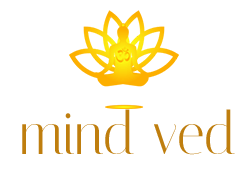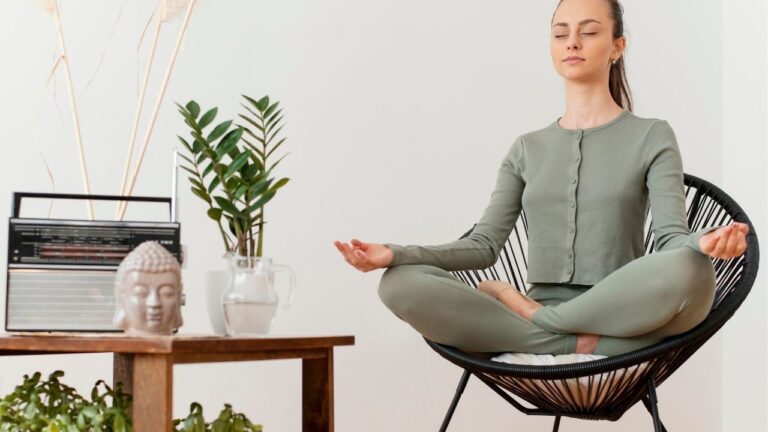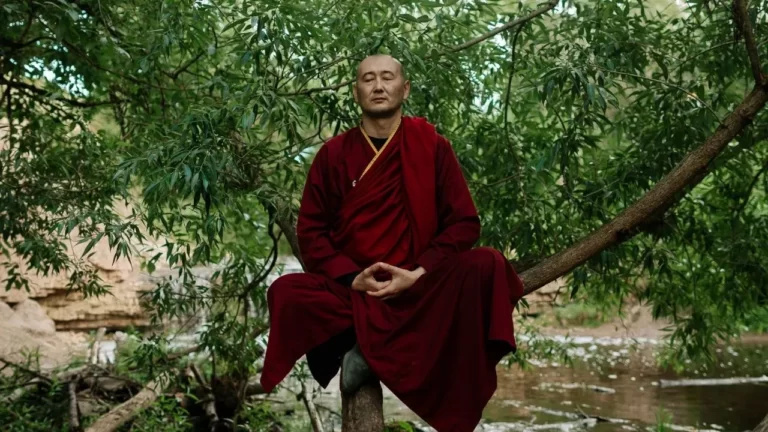What is Meditation and its Benefits?
What is Meditation?
Meditation is all about your journey towards self-awareness and consciousness. It awakens and enlightens us. Our scriptures reveal that meditation is not merely sitting and closing of eyes or chanting of god’s name and mantras, it means looking inwards to one’s innermost being.
The Yoga Sutras of Patanjali defines the eight limbs of yoga and meditation as the seventh limb of yoga, which is also called’ Dhyana’.
In meditation, senses merge with the mind, the mind merges with the intellect, intellect merges with the individual soul and the individual soul becomes one with the universal soul.

The main purpose of practicing meditation is to achieve ‘oneness’ or communication with the universe.
But you will get many other benefits from practicing meditation regularly.
Definition of Meditation
As per the dictionary, Meditation is the act of remaining silent and calm state for some time, as part of religious training, or so that you are capable to deal with the problems of daily life.
In Psychology, Meditation is the family of mental training practices that are designed to familiarize the practitioner with specific kinds of mental processes.”
Understand the Meditation
To understand meditation in-depth, one has to understand the aspects of the human being with their function.
As per the Vedic science, the human being consists of three aspects-
- Physical body
- Inner faculty-
- Mind: processes sensory perceptions received from sense organs
- Intellect: Analyse, discriminates, decides, and judges
- Ego: doer and experiencer
- Chitta: Storage of all memories and impressions of life
- Deep inner self: It is pure consciousness, source of knowledge, intelligence, creativity, etc.
Vedic science explained that the deep inner self activates the inner faculty (working consciousness), which in turn activates the physical body.
In meditation, the feedback loop to the deep inner self provides inner peace and bliss, which removes all stresses of life and improves overall health.
What the Science View About the Effectiveness of Meditation?
Due to growing technology and competition in the world, stress has become a part of our lives. And from last year, the situation is worsened in the covid pandemic. Meditation is the best tool to manage stress and emotional changes.
Psychologists and allied mental health practitioners agree on the effectiveness of meditation in lowering physical, mental, and emotional disturbances. They recommend meditation for physical, mental, and emotional benefits.
Scientists have put forth some evidence on how meditation rewires the brain to promote inner peace and equilibrium.
- Neuropsychological studies have found increased grey matter density in the prefrontal lobe, which is primarily responsible for executive functioning like planning, problem-solving and emotional regulation. Studies suggested that regular meditation regulates the function of the prefrontal cortex, and controls emotions by limiting negative thinking. (Goyal et al.,2014)
- Meditation controls the ‘monkey mind’ and promoting mental balance (Luders, Cherbuin, & Kurth,2015). Monkey mind means brain’s Default Mode Network (DMN) which is responsible for what we think when we do not attend to anything specific.
- Meditation also has an impact on the medial prefrontal cortex (commonly known as ‘Me Center’), which is responsible for our perceptions, understanding, and knowledge (Pradhan, Gogineni, & Sharma,2018). When we meditate, it weakens the neural connections means we don’t react strongly to sensations. Thus, we can easily look at the sensations rationally.
Process Steps of Meditation
The process of meditation is quite simple but systematic which takes practice and patience to learn. You can meditate anywhere, at any time without any special equipment.
- Find a quieter and comfortable place for meditation.
- Decide the time duration as per your capacity. Beginners should choose a short duration, and increase the duration gradually.
- Take a comfortable position to meditate. You can sit on a mat or chair, with either open legs or crossed.
- Concentrate and feel the breathing in terms of inhaling and exhale.
- The thoughts are wandering in the mind. Be aware of your thoughts and when you realize your mind is wandering and you cannot focus on your breathing, just move your attention back
- Don’t harsh on yourself, let the thoughts come and go naturally. Understand the process and try again to concentrate. Daily practices make you perfect.
- In the end, open your eyes slowly if closed, and slowly come into ease pose. Continue sitting for few seconds and reflects upon some thoughts or feelings arouse during meditation.
Different Types of Meditation: What Suits You?
There are a lot of types or techniques of mediation. Depending on your need, you can choose one and see if that is the right meditation for you. We suggest do an experiment with different meditation techniques for a short period and note down the experiences. Thus, you may find out the best meditation for yourself.
Here is the long list of meditations
- Mindful Meditation
- Spiritual Meditation
- Movement Meditation
- Focused Meditation
- Mantra Meditation
- Transcendental Meditation
- Progressive Relaxation
- Loving Kindness Meditation
- Visualization Meditation
- Zen Meditation
- Taoist Emptiness
- Vipassana
- Chakra
- Qigong
- Reflection etc.
You will get details of these meditation types in our upcoming blogs in the Meditation section.
Benefits of meditation
There are numerous benefits of daily practicing meditation. It is roughly categorized into physical health benefits, mental health benefits, and spiritual benefits, etc your better understanding.
Physical health benefits:
As per the psychologist, you are completely fit only if your mind and body function equally well. If your mind is cloudy with negative thoughts and stress, you will not get proper benefits from the workout. Here, mediation helps clear the negativity and stress and continuously motivates your brain and body to keep going.
- Meditation makes your body and minds more active and energetic. It fills every cell of the body with Prana (Energy). Thus, you get the inner source of energy.
- It reduces the risk of heart disease and stroke and also lowers high blood pressure.
- It acts as an immunity booster. It lowers the risk of cancer by boosting the lymphocyte count in the body, also develops a natural shield against fatal diseases.
- It lowers the risk of Alzheimer’s and premature death.
- It decreases any tension-related pain, like tension headache, insomnia, ulcers, muscles, and joint pain.
Mental Health benefits:
The most important benefit of meditation would be better self-awareness, self-understanding. Meditation pinpoints the exact problem with the mind.
When your mind is captured by negative feelings, stress, depression, etc, you feel overwhelmed, unstable, or emotionally shut down. Here Meditation helps to strengthen the mind and your mind becomes fresh, delicate, and beautiful.
- Meditation lowers the stress and anxiety
- It improves tolerance and patience capacity and gives emotional stability
- It helps to overcome postpartum blues in pregnant women and new mothers due to sudden hormonal flushes in the body.
- It makes you creative and you get happiness from your creativity.
- It gains clarity on thoughts and provides peace of mind.
- It promotes mental balance by controlling the monkey minds (the term for Default Mode Network), it means our mind wanders and distracted us when we do not attend to anything specific.
- It sharpens the mind by improving focus and expands through relaxation, and balance it for the perfection
Spiritual benefits of meditation
Meditation is not for any specific religion and can be practiced by anybody regardless of the faith they follow.
- Meditation helps you to find inner peace and tranquillity.
- It makes you realize the eternal truth and let go of the past and future thoughts.
- It helps you to realize who you are, it is a way to connects with yourself and through better connection to self, create a better connection to others.
- It helps to merge yourself with the infinite universe and gives the experience of oneness.
- It empowers you and opens the gateway of higher consciousness.
Benefits of meditation for students
- It brings greater confidence in students.
- It increases cognitive retention
- It improves concentration, gives clarity and students become more focused,
- It improves academic performance
- It provides better sleep and better health
- It improves social skills and creates self-awareness in students.
Don’t and Do’s of meditation for beginners
- Don’t look at meditation as a quick fixer for your problem
It is important to know that mediation will not fix everything in one go. It is a long-term process, and you have to be regular to get its long-term benefits. Stick to the routine. You can flexible with time but regularity is important.
Example: When we exercise regularly for few months, our body starts to lose fat and start to build muscles, but if we stopped our workout, again our body started to gain weight. Same way, when we practice meditation daily, our minds became clean and calm like water. If we stop meditation, we lose control on mind. The mind starts losing clarity and concentration. So, regularity is important to maintain whatever we achieve.
- Don’t do it with too many expectations
It is harmful to keep baggage of expectations while you practicing meditation. Do it with an open mind and let go of all your expectations and goals. Just experience inner peace and stillness, slowly you may reach your goals.
- Don’t worry about obstacles
Meditation teaches you to let go and go with the flow. Don’t worry if you are not able to focus on your breath. Let the thought come and go, try again to bring back your mind. Slowly you will get hold of it.
The Do’s of Meditation
- Do meditation in a serene spot
Whether you do it alone at home or in a group, it is always better to choose a serene spot, because you may be distracted by your surroundings.
- For beginners, do meditation in a group
Meditation requires efforts and determination to just sit still. Beginners may feel bored or sleepy. It may be discouraging for them. In a group, the struggles and experiences of others may encourage you.
- Do it for a short time
For beginners, it is very hard to sit for a long time without doing anything. Select short time meditation for few days or till you get command on it and then gradually increase the duration.
Read More:
- Best Meditation for the Beginners
- Different Types Of Meditation
- Best Meditation for Concentration and Focus
- How to get a Peaceful Mind
- Letting Go and Letting God Take Control
Conclusion
Meditation has great benefits for psychological well-being. Meditation is a means of giving a good life to a person and it is a state of absolute bliss. By achieving this, we can live our lives with complete mindfulness. Meditation helps to control the mind and body and soul.
FAQ:
Q. What is the best time to meditate?
A. Generally, early morning is the best time. But any time that fits in your routine schedule is good.
Q. Should I meditate alone or in a group?
A. Both are great. You can choose any option which is comfortable for your nature.
Q. How much should I meditate?
A. You can start with a minimum of 1-minute meditation and gradually increase it as per your routine. It’s okay if the time duration is flexible but it is important to be regular.
Q. Should my eyes be open or closed while meditating?
A. If you are not focusing on your mind, you can close your eyes or keep them softly open.
Q. Should I always meditate in the same place?
A. It is good to meditate at the same place and time because our body and mind became familiar with the place or the environment, so it is easier for us to focus.






